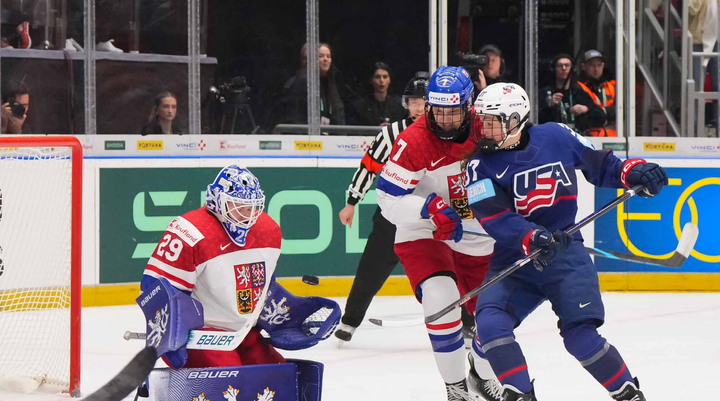Erica Ayala is pushing the conversation in women’s hockey
Her video series features conversations with a variety of players.
Anyone who follows women’s hockey has been impacted by the work of Erica Ayala.
Recently, her work in hockey has been impactful beyond the rink as well.
A freelance sports journalist who made the transition from working full-time in advocacy to one of the most prevalent women’s sports journalists of the past five years, Ayala’s video series, “Social Justice in Women’s Hockey” has earned extra attention during a time where anti-racism is in the mainstream spotlight.
She’s more equipped than almost anyone in sports journalism for the moment - especially in an environment where few Black women have a presence.
“Social Justice in Women’s Hockey aims to have conversations with women’s hockey players primarily about things like racism, homophobia, all the isms that we in society are seeing rise,” said Ayala. “Often in the hockey space they’re not discussed or addressed head-on. The timing happened to, for a lack of a better term, work out. But I’ve been having these conversations with women’s hockey players, especially Black or multi-cultural, for several years.”
Ayala’s series has had conversations with pro women’s hockey players such as Blake Bolden, Allie Thunstrom, and Liz Knox, and has picked up steam in the hockey community with social media boosts from the NWHL and Los Angeles Kings.
Recording two new episodes of Social Justice in Women's Hockey tomorrow! I've learned a lot from the first four guests, excited to keep the conversation going!
— Erica L. Ayala, MPA (@elindsay08) June 21, 2020
What has been your favorite part of the series so far?https://t.co/x757RZhKHv
She’s brought in hundreds of views, giving a platform for social issues that usually are avoided in sports journalism, and continue to be at many mainstream publications despite the public interest.
“I challenged myself to bring this conversation more public,” she said. “And to start with Blake and Allie. The situation with Allie, in a lot of ways, sparked the open dialogue because being part of the hockey community, I saw her tweet…. I personally kind of did a double take, then I remembered Allie lives in Minnesota. Also as a person who identifies as Black, I didn’t appreciate the tweet, I also had to remind myself in that moment I don’t live in Minnesota.”
Ayala’s background is in covering basketball and the WNBA — which she covered at The Athletic — and as a softball and baseball player growing up. A New York native, she attended Elon University where she played Division I softball.
She said that’s a time she’s reflected on more recently as a Black athlete in a predominantly white sport, which is reflected somewhat in hockey.
Her experiences have aided her in carving out a niche in an already niche community of women’s sports.
“There’s space for the type of writing I like to do,” said Ayala. “I have my own personal opinions and I don’t hide from them at all. But I think being in advocacy, people don’t realize advocates have to be good listeners, especially if they’re advocating for behalf of a community they don’t belong to; that’s hockey for me. I don’t want to say I don’t belong, but it’s not the community I grew up in.”
Ayala most recently served as the color commentator for the Connecticut Whale and Boston Pride, while also writing for The IX newsletter. As a freelancer, building a platform can be difficult, but she’s powered through to become full-time as a freelance sports journalist covering almost exclusively women’s sports.
“Social Justice in Women’s Hockey” picked up steam in the public eye due to the racism crisis in America, but her work in sports had an impactful outreach far before that, from her game coverage to the hard conversations she’s had with athletes that many media members haven’t attempted.
“When you try to contain people into what they should be as an athlete, as a woman, as a Black person, you’re missing all the other ways they can identify,” said Ayala. “That’s what people are asking for now, and that’s always been the woman’s plight. Being seen as a woman in totality. I see my background in advocacy being an asset.”
When sports return in a safer world, there’s no doubt Ayala will continue to be one of the voices of women’s sports on broadcasts and on social media.
In a world — especially in sports — that doesn’t make space for Black people or women, she’s carved out her own space; it’s something to be admired, but also a space that heeds listening.
“I kind of feel this is something I have to do,” she said. “I don’t always like it, but there’s not a moment that goes by that I question anything. I don’t fear asking questions. I’m not afraid, and that’s powerful on itself. I’m hoping by opening that door, someone opens their own reflection of where they are in this conversation.”





Comments ()